#also plus points for liev schreiber
Explore tagged Tumblr posts
Note
At the end of the trailer for Meeting Zelensky, does Ze say "Don't be afraid Olena"? Was he referring to Olena Olena? Was she in the same room? Are they going to be interviewed together? 🤔
Yes, he does and I was wondering the same. 😄
It could very well be that our Olena was present because they're getting interviewed together or she was just spending time with him or came for a visit.
Based on the one short clip in the trailer she got interviewed somewhere else alone. But there could still be a part with a couple interview.
Or someone from the team is also named Olena and Ze talked to that person. 😄🤷♀️
#im really really REALLY looking forward to that documentary#the trailer already looks so good!!!!#i have high expectations for that one#looks like theyre going to talk a lot about prepresidency#love that they included olena#lets see who else is part of it#i really hope they release it in a way that everyone can see it#also plus points for liev schreiber
2 notes
·
View notes
Text
round up // JULY 21
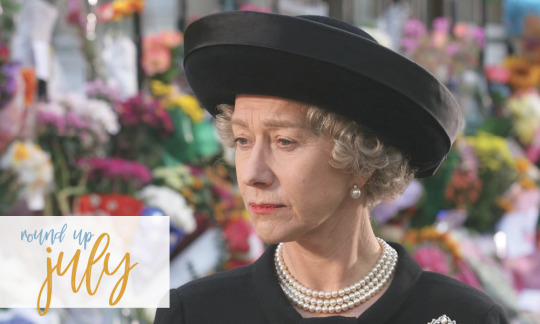
‘Tis the season to beat the heat at the always-cold theatres and next to fans set at turbo speed. While my movie watching slowed a bit with the launch of the Summer Olympics on July 23rd, I’ve still got plenty of popcorn-ready and artsy recommendations for you. A few themes in the new-to-me pop culture I’m recommending this month:
Casts oozing with embarrassing levels of talent (sometimes overqualified for the movies they’re in)
Pop culture that is responding or reinterpreting past pop culture
Stories that get weEeEeird
Keep on-a-scrollin’ to see which is which!
July Crowd-Pleasers
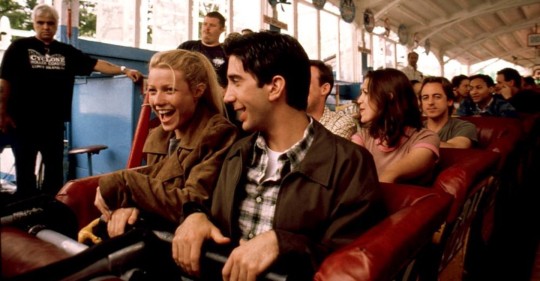
1. Double Feature – ‘90s Rom-Coms feat. Lots of Lies: Mystery Date (1991) + The Pallbearer (1996)
In Mystery Date (Crowd: 7.5/10 // Critic: 6/10), Ethan Hawke and Teri Polo get set up on a blind date that gets so bizarre and crime-y I’m not sure how this didn’t come out in the ‘80s. In The Pallbearer (Crowd: 8/10 // Critic: 7/10), David Schwimmer and Gwyneth Paltrow try to combine The Graduate with Four Weddings and a Funeral in a story about lost twentysomethings. If you don’t like rom-coms in which circumstances depend on lots of lies and misunderstandings, these won’t be your jam, but if you’re like me and don’t mind these somewhat-cliché devices, you’ll be hooked by likeable casts and plenty of rom and com.
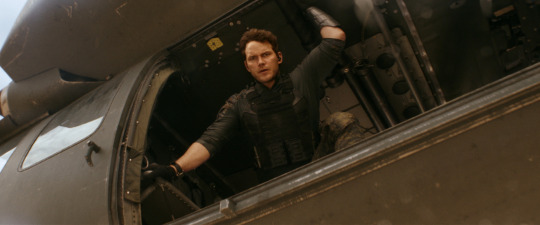
2. The Tomorrow War (2021)
I thought of no fewer movies than this list while watching: Alien, Aliens, Angel Has Fallen, Cloverfield, Interstellar, Kong: Skull Island, Prometheus, A Quiet Place: Part II, Star Wars: The Empire Strikes Back, Star Wars: The Revenge of the Sith, The Silence of the Lambs, The Terminator, Terminator 2: Judgment Day, and World War Z. And you know what? I like all those movies! (Okay, maybe I just have a healthy respect/fear of The Silence of the Lambs.) The Tomorrow War may not be original, but it borrows some of the best tropes and beats from the sci-fi and action genres, so much so I wish I could’ve seen Chris Pratt and Co. fight those gross monsters on a big screen. Crowd: 9/10 // Critic: 6/10
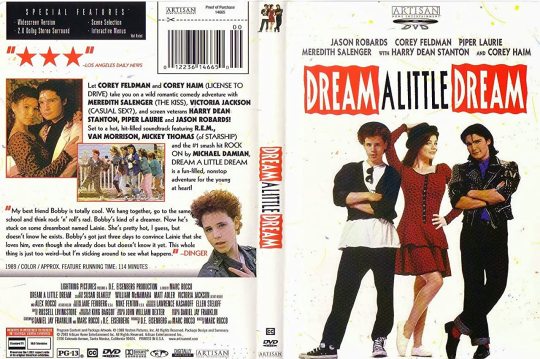
3. Dream a Little Dream (1989)
My July pick for the Dumb Rom-Com I Nevertheless Enjoyed! I CANNOT explain the mechanics of this body switch comedy to you—nor can the back of the DVD case above—but, boy, what an ‘80s MOOD. I did not know I needed to see a choreographed dance routine starring Jason Robards and Corey Feldman, but I DID. All I know is some movies are made for me and that I’m now a card-carrying member of the Two Coreys fan club. Crowd: 8/10 // Critic: 6.5/10
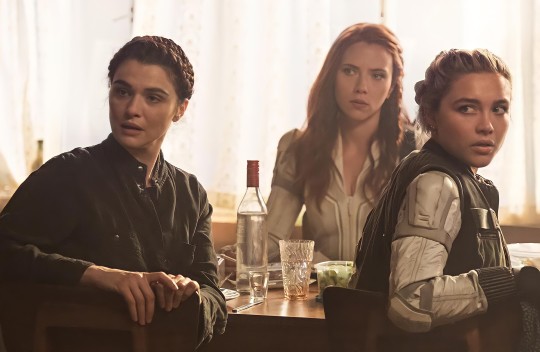
4. Black Widow (2021)
The braids! The Pugh! Black Widow worked for me both as an exciting action adventure and as a respite from the Marvel adventures dependent on a long memory of the franchise. (Well, mostly—keep reading for a second MCU rec much more dependent on the gobs of previous releases.) Crowd: 9/10 // Critic: 7.5/10
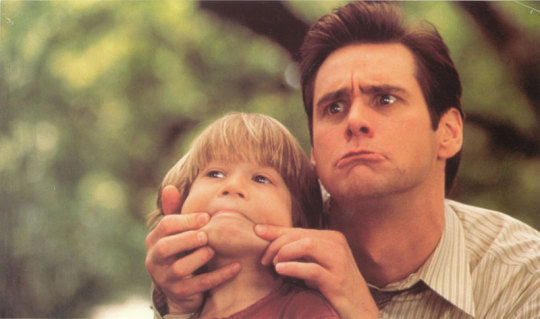
5. Liar Liar (1997)
Guys, Jim Carrey is hilarious. That’s it—that’s the review. Crowd: 9/10 // Critic: 7/10
youtube
6. Sob Rock by John Mayer (2021)
It’s very possible I’ve already listened to this record more than all other John Mayer records. It doesn’t surpass the capital-G Greatness of Continuum, but it’s a little bit of old school Mayer, a little bit ‘80s soft rock/pop, and I’ve had it on repeat most of the two weeks since it’s been out. Featuring the boppiest bop that ever bopped, at least one lyrical gem in every track, and an ad campaign focused on Walkmans, this record skirts the line between Crowd faves and Critic-worthy musicianship.
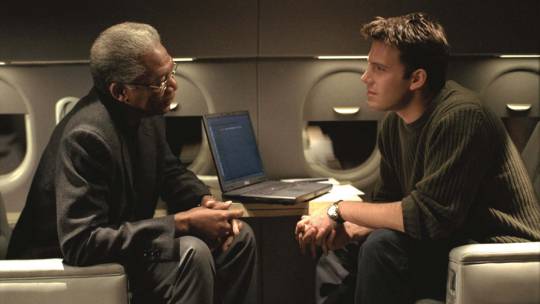
7. Double Feature – ‘00s Ben Affleck Political Thrillers: The Sum of All Fears (2002) + State of Play (2009)
In The Sum of All Fears (Crowd: 8.5/10 // Critic: 7.5/10), Ben Affleck is Jack Ryan caught up in yet another international incident. In State of Play (Crowd: 8/10 // Critic: 7/10), he’s a hotshot Congressman caught up in a scandal. Both are full of plot twists and unexpected turns, and in both, Affleck is accompanied by actors you’re always happy to see, like Jason Bateman, James Cromwell, Russell Crowe, Jeff Daniels, Viola Davis, Morgan Freeman, Philip Baker Hall, David Harbour, Rachel McAdams, Helen Mirren, Liev Schreiber, and Robin Wright—yes, I swear all of those people are in just those two movies.
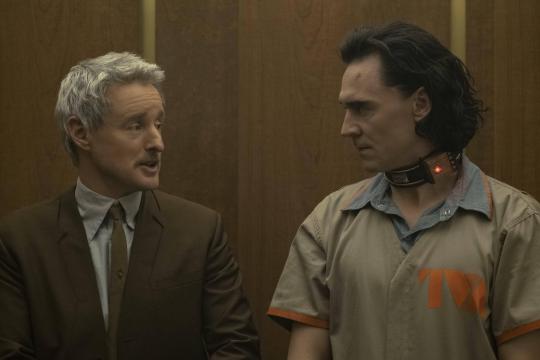
8. Loki (2021-)
Unlike Black Widow, you can’t go into Loki with no MCU experience. The show finds clever ways to nudge us with reminders (and did better at it than Falcon and the Winter Soldier), but be forewarned that at some point, you’re just going to have to let go and accept wherever this timeline-hopper is taking you. An ever-charismatic cast keeps us grounded (Owen Wilson, Jonathan Majors, and an alligator almost steal the show from Tom Hiddleston in some eps), but while Falcon lasted an episode or two too long, Loki could’ve used a few more to flesh out its complicated plot and develop its characters. Thankfully, the jokes matter almost as much as the sci-fi, so you can still have fun even if you have no idea what’s going on.
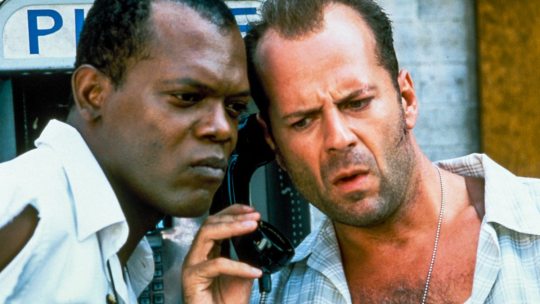
9. Double Feature – Bruce Willis: Die Hard With a Vengeance (1995) + The Whole Nine Yards (2000)
Before Bruce Willis began starring in many random direct-to-DVD movies I only ever hear about in my Redbox emails, he was a Movie Star smirking his way up the box office charts. In the third Die Hard (Crowd: 10/10 // Critic: 7.5/10), he teams up with Samuel L. Jackson to decipher the riddles of a terrorist madman (Jeremy Irons), and it’s a thrill ride. In The Whole Nine Yards (Crowd: 9/10 // Critic: 8/10), he’s hitman that screws up dentist Matthew Perry’s boring life in Canada, and—aside from one frustrating scene of let’s-objectify-women-style nudity—it’s hilarious.
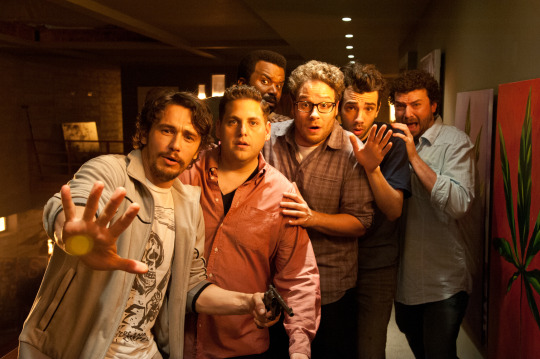
10. This Is the End (2013)
On paper, this is not a movie for me. An irreverent stoner comedy about a bunch of bros partying it up before the end of the world? None of things are for Taylors. But with a little help of a TV edit to pare down the raunchy and crude bits, I laughed my way through and spent the next several days thinking through its exploration of what makes a good person. While little of the plot is accurate to Christian Gospel and theology, some of its big ideas are consistent enough with the themes of the book of Revelation I found myself thinking about it again in church this morning. (Would love to know if Seth Rogen ever expected that.) Plus, I love a good self-aware celebrity spoof—can’t tell you how many times I’ve just laughed remembering the line, “It’s me, Jonah Hill, from Moneyball”—and an homage to horror classics. Crowd: 8/10 // Critic: 7/10
July Critic Picks
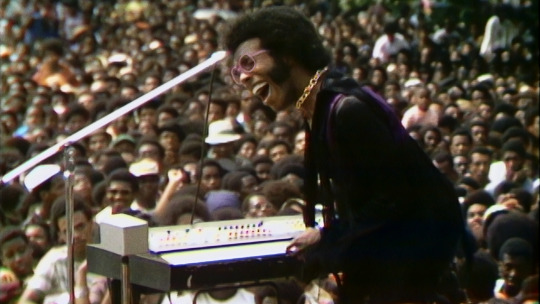
1. Summer of Soul (…or, When the Television Could Not Be Televised) (2021)
Even director Questlove didn’t know about the Harlem Cultural Festival, but now he’s compiled the footage so we can all enjoy one of the coolest music fest lineups ever, including The 5th Dimension, B.B. King, Gladys Knight and the Pips, Nina Simone, Sly and the Family Stone, and Stevie Wonder, who made my friend’s baby dance more than once in the womb. See it on the big screen for top-notch audio. Crowd: 8/10 // Critic: 9/10
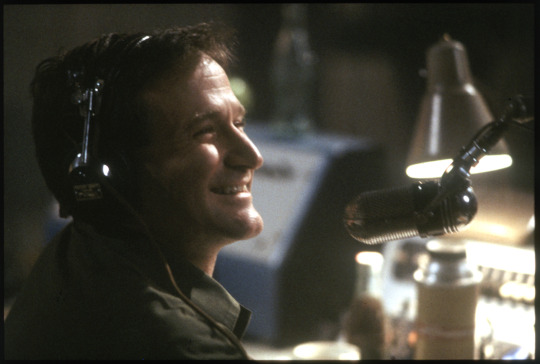
2. Good Morning, Vietnam (1987)
Robin Williams takes on the bureaucracy, disillusionment, and malaise of the Vietnam War with comedy. Williams was a one-of-a-kind talent, and here it’s on display at a level on par with Aladdin. Crowd: 8/10 // Critic: 9/10

3. Against the Rules Season 2 (2020-21)
Michael Lewis (author of Moneyball, adapted into a film starring Jonah Hill), is interested in how we talk about fairness. This season he looks at how coaches impact fairness in areas like college admissions, credit cards, and youth sports.
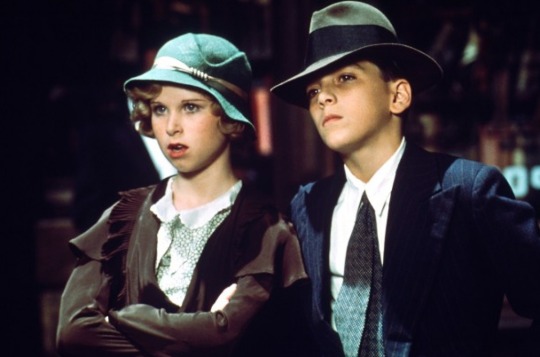
4. Bugsy Malone (1976)
A gangster musical starring only children? It’s a little like someone just picked ideas out of a hat, but somehow it works. You can hear why in the Bugsy Malone episode Kyla and I released this month on SO IT’S A SHOW?, plus how this weird artifact of a film connects with Gilmore Girls.
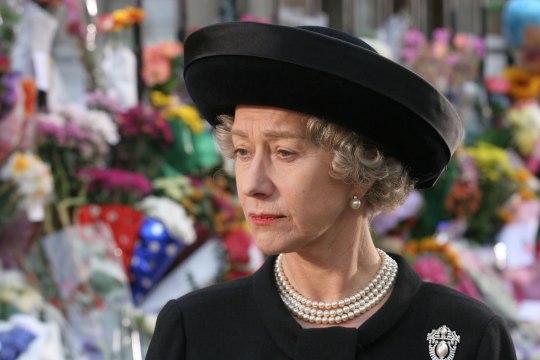
5. The Queen (2006)
Before The Crown, Peter Morgan wrote The Queen, focusing on Queen Elizabeth II (Helen Mirren) in the days following the death of Princess Diana. It’s a complex and compassionate drama, both for the Queen and for Prime Minister Tony Blair (Michael Sheen, who has snuck up on me to become a favorite character actor). Maybe I’ve got a problem, but I’ll never tire of the analysis of this famous family. Crowd: 8.5/10 // Critic: 9.5/10
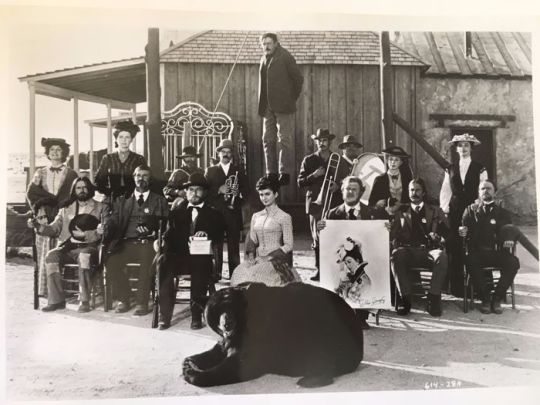
6. The Life and Times of Judge Roy Bean (1972)
This month at ZekeFilm, we took a closer look at Revisionist Westerns we’ve missed. I fell hard for Roy Bean, and I think you will, too, if for no other reason than you might like a story starring Jacqueline Bisset, Ava Gardner, John Huston, Paul Newman, and Anthony Perkins. Oh, and a bear! Crowd: 8.5/10 // Critic: 10/10
youtube
7. New Trailer Round Up
Naked Singularity (Aug. 6) – John Boyega in a crime thriller!
Queenpins (Aug. 10) – A crime comedy about extreme coupon-ing!
Dune (Oct. 1) – I’ve been cooler on the anticipation for this film, but this new look has me cautiously intrigued thanks to the Bardem + Bautista + Brolin + Chalamet + Ferguson + Isaac + Momoa + Zendaya of it all.
The Last Duel (Oct. 15) – Affleck! Damon! Driver!
Ghostbusters: Afterlife (Nov. 11) - I’m not sure why we need this, but I’m down for the Paul Rudd + Finn Wolfhard combo
King Richard (Nov. 19) - Will Smith as Venus and Serena’s father!
Encanto (Nov. 24) – Disney and Lin-Manuel Miranda making more magic together!
House of Gucci (Nov. 24) - Gaga! Pacino! Driver!
Also in July…
Kyla and I took a look at the classic supernatural soap Dark Shadows and why Sookie might be obsessed with it on Gilmore Girls.
I revisited a so-bad-it’s-good masterpiece that’s a surrealist dream even Fellini couldn’t have cooked up. Yes, for ZekeFilm I wrote about the Vanilla Ice movie, Cool as Ice, which is now a part of my Blu-ray collection.
Photo credits: Against the Rules. All others IMDb.com.
#Round Up#Mystery Date#The Pallbearer#The Tomorrow War#Dream a Little Dream#Black Widow#Liar Liar#Bugsy Malone#Sob Rock#John Mayer#Sob Rock John Mayer#The Sum of All Fears#State of Play#Loki#The Whole Nine Yards#Summer of Soul#Good Morning Vietnam#Against the Rules#The Life and Time of Judge Roy Bean#Die Hard With a Vengeance#This Is the End#The Queen
11 notes
·
View notes
Text
Psycho Analysis: Liev Schreiber Birthday Special - Sabretooth, Kingpin, and The Storm King
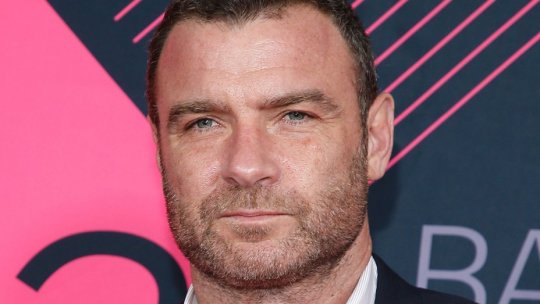
(WARNING! This analysis contains SPOILERS!)
Liev Schreiber is quite an actor, one that I think it is sadly easy to overlook despite his talent at portraying villains or other morally dubious characters. From his integral role in the Scream movies to his later numerous villainous roles, he manages to show himself as a rather skilled and versatile actor, particularly in regards to the latter; Schreiber is easily able to slip into playing a villain and deliver a fantastic performance… most of the time anyway.
The date I’m posting this on (October 4, 2019) is his birthday, so we’re going to take a look at three of his biggest villain roles to date:

Sabretooth from X-Men Origins

The Storm King from My Little Pony: The Movie
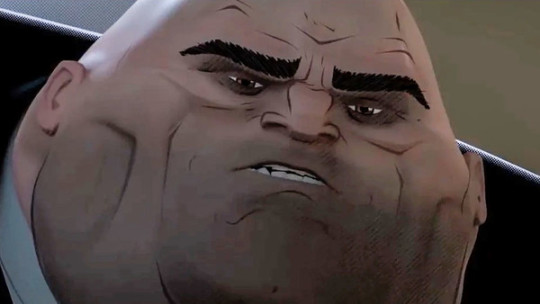
Kingpin from Into the Spider-Verse
The first is a great villain trapped in an awful movie; the second is an awful villain inside a fun and enjoyable movie; and the third is a great villain in an outstanding movie.
Motivation/Goals: Sabretooth is, in short, a psychopath. The guy lives for the thrill of battle, and is never satisfied unless he has someone to kill. He’s a predator, using the numerous wars he and his half-brother Logan fought in throughout history to sate his appetite, but it was never enough. Vietnam is when he really lost it, and soon after that his relationship with Logan became tarnished, leading to their numerous conflicts throughout the film. It’s rather simple, yet it’s effective. This is what we want from Sabretooth after all, a bloodthirsty, murderous psychopath who crosses every line imaginable and who just really wants to make Logan as miserable as possible.
The Storm King is kind of approaching dominating Equestria as if it were a business venture, complete with merchandise. Beyond that, he’s a bit of a one-note evil overlord, with none of the complex motivations and characterizations of the other antagonist of the film, Tempest Shadow. He’s just here for some quick laughs and to be the final boss in the third act.
Kingpin has my favorite motivation out of the entire lot: once when he was battling with Spider-Man, his wife and child walked in, and in fear and horror they fled, driving off only to be struck by a truck and killed. Kingpin then shoveled as much money as he could and hired the likes of Doc Ock and Green Goblin to help create a giant dimensional portal all so he could be reunited with his family. It’s such a tragic motive that adds layers of depth to Kingpin, and ultimately makes him an interesting foil for Miles, who decides to continue fighting so he can live up to those he loses (Peter and his uncle) while Kingpin cannot accept his loss or his responsibility and so decides to damn everyone else in his desperate struggle to undo the damage he himself caused.
Personality: Sabretooth is easily the most simple of the villains, in that he is just a completely unrepentant monster who revels in the fact he is a vicious, remorseless killer. Normally a villain like that would be boring and generic… but this is Sabretooth. This is what we want out of him. Add in his brotherly banter with Wolverine and his single-minded desire to ruin Logan’s life at every turn, and he just ends up being a really fun and engaging take on the character, with Schreiber injecting just the right amount of soft-spoken sadism and menace to make Victor Creed pants-crappingly terrifying.
Kingpin is a sleazy, scummy mob boss. He’s another seemingly simple character, but his design really helps show what kind of guy he is without telling us. This iteration of Wilson Fisk really plays up him being a mountain of a man, with him being a hulking behemoth with a very bulky design. Despite being a normal human, he looks like the kind of guy who could kill a superhuman with his bare hands. Despite all this, he does have sympathetic (but, and this can’t be stressed enough, not redeeming) qualities, such as his love for his family and his single-minded desire to be reunited with them. Of course, this desire is what leads to most of the troubles in the film, so he does show the dangers of that sort of careless and reckless pursuit of a goal is a bad thing, no matter how noble it seems.
Final Fate: The Storm King is the only character out of these three with a clear-cut fate, and it goes a long way to redeeming how bland the character is due to how out-of-place and dark it seems in the world of Friendship is Magic. In short, he is turned to stone, and his statue is allowed to drop to the ground, where he shatters into pieces. By all accounts, he is dead, a fate that seems to befall all terrible Friendship is Magic villains (cough Sombra cough).
Kingpin is the most open-ended, as after Miles stops him and in true Spider-Man fashion strings him up for the police. This does open up the door for Kingpin to appear again, which is a plus. The final showdown beforehand is a lot more interesting. The beatdown he gets from Miles, where Miles gets up from the pummeling that killed Peter and delivering a confident “Hey” like his uncle taught him right on Kingpin’s shoulder, sending him flying back to shut down his dimensional portal really is an awesome moment for the film and Miles in general.
Sabretooth… it really is impossible to say. He apparently makes it out of this film alive, but Schreiber’s Sabretooth is so disconnected from the one who appears later in the timeline (mostly on the token that Schreiber’s take is actually good and memorable) that it’s impossible what to say happened to him. Further muddying the waters is the numerous canon retcons to the timeline as shown in films like Days of Future Past, which altered the timeline in baffling ways such as causing people to be born earlier than they would have been, and then there’s the deleted idea for his cameo in Logan… Really, there’s no telling what exactly Happened to Victor Creed, as the X-Men series is such an utter mess.
Best Scene: Sabretooth has a few, such as the awesome opening montage where he and his brother fight through multiple wars, but perhaps the best part is when he and Wolverine team up to kill that awful thing pretending to be Deadpool. The real Deadpool would beat them to the punch much later in Deadpool 2, but hey, at least he knew what had to be done when he had the chance.
Kingpin’s is almost definitely the scene where he kills Peter, which shows him going through a shocking amount of emotion, but there’s also the flashback to his family’s demise or even that moment on the train where he becomes a lifetime achiever in the Pontoffel Pock Awards by screwing up in every conceivable reality imaginable and disturbing an entire multiverse worth of his family in his quest to murder Miles. Few people screw up on that epic of a scale.
The Storm King… I don’t know. He’s kinda scary in his final battle? Maybe when he plays with the sun and the moon? Nothing really stands out for him super well, because quite frankly he is massively overshadowed by Tempest Shadow, who has the honor of getting the villain song of the movie. And let me be completely frank: if you are a villain in a musical, and you don’t get a song, you suck. Period.
Best Quote: For Sabretooth, it has to be this quote that really sums up who he is: “I'm not your friend. I'm an animal, who dreamed he was a man. But the dream is over. And the beast is awake. And I will come for you without mercy, because it's my nature.”
Kingpin is a little trickier, because Wilson Fisk is a man of actions, rather than words; I feel like he doesn’t have too many great quips, but he has a plethora of awesome actions. However, I DO enjoy his intro, where Schreiber just kills it with the delivery and establishes Fisk right off the bat as one hell of a crime boss: “Doo-be do. Doo-be do. Yub-yub, doo-bee do, doo-bee-do. Watch out! Here comes the Spider-Man! You like my new toy? Cost me a fortune, but hey, can't take it with you, right? You came all this way. Watch the test. It's a hell of a frickin' light show, you're gonna love this.”
For Storm King… well, this is kind of a funny line: “Here's the deal. I'm in the middle of a big rebrand here. "The Storm King" is tracking, well, as "intensely intimidating", but you know what? I need to back it up. You know what I need to back it up with? A STORM! THAT WOULD BE GREAT! You promised me magic that could control the elements, and right now, I'm holding a what? A branch. A twig. Bleh!” Kind of a reach, but I think he does have some decent comedic moments here and there, and his initial, er, phone call with Tempest is charming enough.
Final Thoughts & Score: These guys are really all over the place, but I think they really showcase Schreiber’s talents very well, as well as how to use him effectively.
Sabretooth is easily the best villain out of this bunch. While X-Men Origins: Wolverine is a terrible, bloated mess of a film, Sabretooth is one of the few redeeming factors, with Schreiber turning in a wonderfully terrifying performance as Logan’s arch-enemy. It’s frankly insulting they never had him come back to the franchise, because he was certainly far more deserving of a comeback than someone like Jennifer Lawrence. At least with Schreiber it was clear he cared about the character, which is more than can be said for whoever played the original Sabretooth (a character who is not even worth a Psycho Analysis; there’s just nothing to talk about there).
Really, the only major issues with Sabretooth are the fact that he’s in the bottom of the barrel when it comes to the X-Men franchise and the writing doesn’t do him many favors, but Schreiber is just acting his butt off to the point where it doesn’t matter, he’s selling it, he’s giving us the Sabretooth even the “better” first X-Men movie couldn’t deliver, and he seriously earns that 9/10. It should come as no shock that his take on Victor Creed is the one thing besides Ryan Reynolds fans truly love about the film.
Contrast the Storm King, who is just a depressing waste of potential. The prequel comics set him up to be something far more fascinating than what we get in the movie; he goes from a silly yet cunning overlord to a comical goober who barely gets any screentime, accomplishes half of his evil actions offscreen, and just leaves very little impression on the audience. Not helping is that he is by and large one of the biggest idiots ever seen in the Friendship is Magic franchise, backstabbing his own loyal followers for no good reason and basically playing with his hand revealed. It’s pretty telling that his henchwoman Tempest Shadow is the one who gets the villain song of the film (which, as I’ve pointed out, is a sign that he really, really sucks as a villain) and who is far more memorable, enjoyable, and interesting.
All that being said, I do appreciate the sentiment of the character, and I do like that Schreiber did it so his kids could watch something with him in it that wouldn’t make them scared out of their minds, and I don’t necessarily think Storm King is one of the most horrible villains ever or anything – he’s just boring and a waste of potential. I’d say he just barely makes it to a 3/10, and that’s mostly because he does have some amusing moments and how bad he is is offset by Tempest Shadow being such a fantastic antagonist; if she wasn’t in the movie, he’d easily be a low 2 and a lot less forgivable. That does seem kind of weird, but I think with a villain like Storm King where he’s just a simple goofball being played by a talented actor isn’t so bad as long as there’s an actual, serious antagonist. It doesn’t exactly make him any better but it keeps him from sinking to the rating of soomeone like Jared Leto’s Joker.
Kingpin is, quite simply, fantastic. I love his design, I love his motivation, I love how he just commands the scene when he walks into the room. This guy is just peak villain design, story-wise and design-wise. Some have taken umbrage with the fact that Kingpin is the one who got to kill Peter rather than a more personal foe like Norman Osborn, but frankly I like that they took a unique approach and decided to utilize a more unexpected foe of Spidey’s.
I think what’s best about Kingpin is just how they manage to make him a rather tragic and pitiable figure despite all the evil he does. Normally it would be a tall order to make the man who murders Peter Parker a tragic figure, but somehow the film manages, showing him to be a bitter, broken man desperately clinging to the tiny hope he could ever see his family again by destroying the dimensional barriers, no matter the cost. And if someone tries to tell him otherwise? Kill ‘em. Obviously this doesn’t excuse his actions, and the movie thankfully never pretends to, but I like that they made this Kingpin such a rich character in his own right, continuing the trend of Kingpin always being given a fantastic performance. Much like Sabretooth, Schreiber really earns the 9/10 with this fantastic vocal performance and just how impactful and even proactive Kingpin is in the story. He gets two major deaths to his name after all.
Liev Schreiber is such a fascinating actor, one who I think is so often overlooked and ignored. While he certainly is typecast as villains fairly often, I think it’s safe to say he excels at those kinds of roles, and he always manages to inject something unique into his roles. You wouldn’t confuse any of these three villains for each other after all.
#Psycho Analysis#Liev Schreiber#Sabretooth#X-Men#X-Men Origins: Wolverine#My Little Pony#Friendship is Magic#The Storm King#Spider-Man: Into the Spider-Verse#Kingpin
21 notes
·
View notes
Link
Harold Pinter’s Betrayal has returned to Broadway less than six years after the play’s last starry, smashingly successful visit. Don’t let that dissuade you: The new production at the Jacobs is equally excellent, equally exciting, and likely to be a premium-ticket sellout for the duration of its 17-week engagement. This thanks to incisive performances from Tom Hiddleston, Charlie Cox, and Zawe Ashton, plus an intriguing and often surprising production from director Jamie Lloyd.
Hiddleston—a major international star thanks to appearances in The Hollow Crown and Thor, along with other Marvel films—seems to be the magnet for excited ticketbuyers, which is all to the good. But he is also an Olivier-winning stage actor, and his performance here—always lurking, usually brooding, and ever-cautiously shielding the truth (or is he?)—enhances the power of Pinter’s play. Cox, another film superhero (Daredevil) with stage experience (Nick Payne’s Incognito, at MTC in 2016), does similarly well. The pair are well matched, demonstrating a long-time camaraderie masking the secrets and poison-tipped betrayals between them.
The surprise of the evening is Ashton, who was previously unknown to this reviewer (despite numerous U.K. stage and screen credits). She offers an exceptional performance, her Emma dominating the play in a manner which the three actresses I’ve seen in prior productions have not. One of Lloyd’s several intriguing touches has Ashton slinking along the rear wall of the set like a lynx surveying prey, and you literally can’t take your eyes off her.
If I seem hesitant to reveal Lloyd’s handiwork, it is only to preserve his several surprises for future playgoers. (Pinter’s script is spare, with few stage directions to impede directors.) He has placed his cast on an almost bare stage backed by a massive wall that stretches the entire width of the stage from wing to wing, as opposed to the bedroom/restaurant/kitchen scenery typically used in productions of the play. The design comes from Soutra Gilmour, a busy U.K. designer who picked up a Tony nomination for her one previous local visit with Lloyd’s 2012 Cyrano de Bergerac at the Roundabout.
Betrayal seems to have grown more engrossing since its premiere. For this viewer, at least, the original Broadway production in 1980—starring Raul Julia, Blythe Danner, and Roy Scheider, with director Peter Hall and designer John Bury recreating their 1978 Royal National Theatre production—was altogether underwhelming and somewhat sleepy. The play, traveling nine years in time (mostly backward), reveals a triangular relationship among a successful publisher (Hiddleston), his gallery-owning wife (Ashton), and his best friend/her seven-year lover (Cox). The plot was taken from life. The woman in question was TV news journalist Joan Bakewell, memorably dubbed “the thinking man’s crumpet” by a British humorist; her then-husband, a BBC producer/director; and the playwright with whom she had a long affair. Pinter, that is. Bakewell later wrote her own radio play about her seven-year affair with Pinter, Keeping in Touch.
When Betrayal finally reappeared in New York in 2000—with Liev Schreiber, Juliette Binoche, and John Slattery, under the direction of David Leveaux—it was something of a revelation. Pinter’s “Pinteresque” drama was now revealed to be a web of betrayals, secrets, and confessions (and false confessions) that held you riveted. I wondered at the time whether this was perhaps influenced by the fact that in 1980 I was watching three “old” characters dealing with the subject, while in 2000 I myself was 20 years older. This seems not to be the case; the play’s reputation has grown considerably since those first early productions, to the point that it can be successfully revived again and again in both London and New York with increasing audience attention and enthusiasm.
Mike Nichols’ 2013 production, led by Daniel Craig, Rachel Weisz, and Rafe Spall, pointed up the web of infidelities—both marital and intra-personal—underpinning the play. These are further accentuated in director Lloyd’s present production, which originated in March as the capstone of his unprecedented Pinter at the Pinter season, which revived some 30 plays (including numerous one-acts) at the Harold Pinter Theatre.
When first encountered, Betrayal did not by any means look like a future classic. The present production, thanks to Lloyd and his acting company, demonstrates that after 40 years, Pinter’s examination of truth and deception holds up exceedingly well.
Betrayal opened September 5, 2019, at Bernard B. Jacobs Theatre and runs through December 8. Tickets and information: betrayalonbroadway.com
19 notes
·
View notes
Text
Spider-Man: Into the Spider-Verse
On Sunday, my local event cinemas had one session for an advance screening of Spiderman: Into the Spider-verse. So, myself and a half of other Spiderman/marvel fans attended the session.
Let me just say this was fantastic. One of end credit scenes from Infinity War gave us a taste of what this movie would be about but to see the full feature was phenomenal.
Not only do we see the original Peter Parker (voiced by Chris Pine) do his thing but we also see his demise which leads to the new kid on the block, Miles Morals (voiced by Shameik Moore) showing us what his got.
With the help of various parallel dimension Spiderman’s featuring Spider-Gwen (voiced by Hailee Steinfeld), Spider-man Noir (voiced by Nicolas Cage), Peni Parker (voiced by Kimiko Glenn), Spider-Ham ( voiced by John Mulaney) and also including an alternate Peter Parker/Spiderman (voiced by Jake Johnson) and with Aunt May (voiced by Lily Tomlin) coming to the aid as they attempt to take down Wilson “Kingpin” Fisk (voiced by Liev Schreiber), Doctor Olivia “Doc Ock” Octavia (voiced by Kathryn Hahn) and Aaron “Prowler” Davis (voiced by Mahershala Ali).
This movie is incredible; normally when I think of animation, I imagine something more suited for TV screens and not the big screen, but the Sony/Marvel team did an incredible job capturing the comic book characters.
This movie looks as if they just scanned the countless spider-verse comic pages and worked a little magic to bring the character’s abilities to speak to life.
From my point of view there is no fault. Each character was explained in a way that made sense to a non-comic book reader like me.
No doubt when the official screening is released masses will flock. Also, for those that don’t know there is already a sequel in the works.
Oh, and before I forget, yes there is an end credit scene which takes us right back to 1967. It’s hilarious and captures the scene that now lives on forever as a meme.
Also, Into the Spider-verse does have a Stan Lee cameo, his final voice work which is quite touching. There is also a tribute to both Steve Ditko and Stan Lee.
Again, a must see for any marvel comics fan. You won’t be disappointed plus it is much needed after the pain the Russo brother inflicted onto Marvel fans.
#mywriting#spiderman#Spider-Man into the spiderverse#into the spiderverse#spoilers#2nd December 2018#movie review#marvel
2 notes
·
View notes
Link
CRITICAL CONSENSUS HOLDS that Wes Anderson movies are about loss. For some artists, aestheticism acts as a kind of spider’s silk: a complexly structured beauty proves best for binding and healing whatever wound. As with a play by the unloved Wilde or a mazurka by the exiled Chopin, the sheer symmetrical precision of an Anderson film knits up and covers over trauma the way that Richie Tenenbaum’s bandages knit up his slashed wrists.
But Isle of Dogs, the director’s most recent stop-motion effort, is not a movie about loss. It’s not even about losing, nor about the ethical and aesthetic miracle of sustaining a marvelously well-ordered fantasy in the face of devastation — you know, that whole Anderson thing.
By contrast, Isle of Dogs is a movie about finding: finding a dog, finding your friends and family, finding your purpose and your identity. So it is slightly difficult to integrate it into the Anderson oeuvre: its primary affect is not sorrow or melancholy but anger, its aesthetic a kind of closely controlled, roiling ickiness: packs of grimy dogs explode into fights, samurai heads fall off, planes burst into immaculate balls of cotton-fluff smoke, sushi fish are hacked up squirmingly alive. At every point in the film (and the film is surprisingly unpleasant to watch for precisely this reason), Anderson seems to ask what forms, what styles, are commensurate to rage — and not just to rage but to a double-pronged, rage-driven teen quest to defeat the patent unfairness of the world.
A first answer would appear to be taiko drumming: in a well of light, surrounded by darkness, three well-fleshed, bare-chested adolescents hammer out a theme by Oscar-winner Alexandre Desplat. We are then drawn into an epic expository sequence about a centuries-old conflict between the dogs of Japan and the cat-loving Kobayashi dynasty, which still controls the fictional Uni Prefecture, which in turns contains the fictional city of Megasaki. Cut to the issuing of a municipal decree by the mayor of Megasaki, who is also the current head of the Kobayashi dynasty, 20 years in the future, as measured from our heterodiegetic present: infected with something called “Dog Flu,” all of the city’s dogs are to be quarantined on Trash Island, now known as the Isle of Dogs. The mayor’s ward, Atari Kobayashi (Koyu Rankin), aged 12 — granted, not quite a teen, but pissed as hell, a classic Anderson pubescent — watches from the shadows as his beloved guard dog, Spots (Liev Schreiber), is sent off in a crate as proof that his guardian means business.
Revealed mostly in flashbacks, Spots’s fate furnishes one of the film’s intricate, Andersonian subplots; just as crammed with reversals, the A story details Atari’s quest to find Spots on Trash Island. He’s helped by a pack of alpha dogs voiced by regular Anderson collaborators: former house pets Rex (Edward Norton), King (Bob Balaban), Boss (Bill Murray), and Duke (Jeff Goldblum), plus Chief (Bryan Cranston), a former stray. If this sounds cute, well, it isn’t. The film’s violence is remarkably violent. Chief’s a scrapper: in his first scene he chews off another dog’s ear. It sits like a hot-sauced chicharron in the center of the screen, vaguely horrid and blood-spotted, until it’s dragged away by a rat. As they journey, the dogs pass through a series of gorgeously bleak landscapes, arguing among themselves all the while. The group’s conflicts usually center on Rex, head of the pets — who wants to help Atari — and Chief, sole gutter spawn, who’s keeping an open mind on the question of whether the dogs should just eat him. Cranston-as-Chief sometimes sounds so threateningly grumpy his performance sometimes loses its comic touch.
The B plot follows Tracy Walker (Greta Gerwig), a foreign exchange student from Ohio and the second prong of Anderson’s preteen anger force. Tracy is a cub reporter on the Megasaki Senior High newspaper; she is also very noticeably pissed. She declares she’s angry at several points. She hates the mayor, hates that he’s corrupt, hates that no one in Megasaki can see how corrupt and unfair the treatment of its dog population might be. She chews her gum so hard you can hear it — that’s how pissed she is. As she discovers that a massive conspiracy lies behind the dogs’ expulsion, she only gets madder. On the hunt for a serum to cure the dogs of Trash Island, she bursts into a bar and screams down a bereaved scientist voiced by Yoko Ono. The scene is almost unwatchably unpleasant: anger is, based on the scantiness of its representation, more unsettling than fear or grief. On the other hand, there’s a certain bravery in showing us a character’s outrage, even at the cost of showing — or trying to show us — things atrocious enough to outrage both the character and the audience.
Unlike cats, who conspire with the corrupt Kobayashis, the dogs of Megasaki are fundamentally innocent — and so, of course, people would send them to hell, misdirection of our own pain or culpability onto the nearest possible Other being the single great talent of humankind. Thus scapegoated, the dogs form their own raggedy community. And again, an ugliness, an ickiness, holds the day despite the ingenuity, the sheer (and familiar) beauty of certain of Anderson’s shots. The emaciated, dirty, insomniac creatures we see in an early montage flirt with the Burton-esque. The atrocities perpetrated on another subcommunity of Trash Island dogs — the survivors of a medical facility where they were experimented on — leaves many of them with glass eyes, tubes sticking out of their necks, or, in the case of the old, much-bereaved dog Gondo (Harvey Keitel), a face that’s half-bald and decorated with medical tattoos. (Keitel’s monologue about the loss of his own fellow canine best friend — riven by instinctive howling — is the film’s best performance.)
Anderson has never shied from medical horror, torture, arterial blood, knives, arrows, severed heads, severed fingers, small arms, pepper spray, flamethrowers, sabers, shoves out of windows and down stairs, punches to the nose, and bigtime scuffles of the squad-of-baddies-on-squad-of-hapless-heroes or bro-on-bro or even the kid-on-kid kind. In Moonrise Kingdom, Social Services threatens 12-year-old Sam Shakusky with electric shock for refusing to betray his true love, Suzy Bishop; Anderson’s previous stop-motion film, Fantastic Mr. Fox, also sports with amputations and gory gallows humor. But Isle throbs with a much darker and more disturbing intensity than any of Anderson’s other films. It flirts with the thin representational line between slapstick and cruelty. In two different instances, we are left to think that our favorite characters — sweet innocent dogs — have either starved to death or been incinerated. Audible gasps of adult discomfort accompanied both scenes both times I saw the film. Not for nothing is its PG-13 rating for “violent images.”
But that makes the film a challenge — its nearest animal-tale analogue, so far as I can tell, is Art Spiegelman’s Maus. At the very least, it helps furnish some internal answer as to what to do about movies that, like this one, seem to make people very mad.
¤
Upon the film’s release, some heralded Isle of Dogs as prescient; they celebrated it, for example, for its celebration of student protest. But the idealism of the pro-dog movement as headed by the gum-snapping, conspiracy-busting Tracy doesn’t much resemble anything that young people might find to protest. In a certain sense — although no one in the film can know this, since the humans and the dogs in Megasaki don’t speak the same language — Chief and co. are quirky but loyal old-fashioned, white-sounding dudes who want nothing more than to find masters. Counterpoised against this wholesome if utterly outdated modus vivendi is a vision of fascist evil decidedly incomplete — a vision of camps and complete dog extermination that conjures up the Holocaust but that leaves aside other ways that fascism has expressed itself in any moment closer to Tracy’s and Atari’s or our own.
Whether it is appropriate to aestheticize the Holocaust is one question (shades of Maus again — but the film has none of the comic book’s claim to history); strong views on both sides would make for a real conversation. But the film has attracted even stronger takes. Though the critical dust has mostly settled, the film’s reception was hampered by charges of cultural appropriation: Justin Chang of the Los Angeles Times wrote a scathing review of what he saw as Anderson’s failures. But as a recent piece at The New Yorker rightly points out, Anderson did not invent the commodification or appropriation of Japanese culture, and Japonism was often aided and abetted by the Japanese. Indeed, the mayor of Megasaki is a thundering Asian dictator — very close to racist stereotype — but then again, he looks not a little like the thundering dictator-to-be who runs our country. And if Anderson’s fictional Megasaki is no more than a Japanese-ish place outside of history, that’s for better and for worse, too. We learn that Trash Island was repeatedly destroyed by the natural disasters to which the Japanese archipelago is in fact susceptible — volcanoes, tidal waves — but the film’s Japan does not seem to have known the unnatural disaster that killed twice as many people as the nearest natural contender. There is something moderately disturbing about a Japan that has never known the American atomic bomb — and then again, there’s something beautiful about it, too.
To me, there is nothing (or maybe only one thing) about Isle of Dogs that seems finally vehemently unjust. In many of its aspects — perhaps especially in its complex idealization of a universal emotion — the film is a reminder that our representations can adopt a playful, inter-cultural permeability. One hopes that at the same time, though, we are still pursuing, honing, and revising a better understanding of what kinds of representations by what kinds of people are just. This knowledge — which is made and assembled and broken down and reassembled collectively, like all other forms of knowledge — involves an awareness not only of race or ethnicity or nationality but of the intersections of those constructs with gender and class and then, too, with history and with the way that historiography is shaped by power relations. And at the same time, a person has to grapple with the idea that elite internationalist culture of the kind Anderson now incarnates exploits anyone who has no access to the free movement of capital between countries.
Which is to say that that process is long and complex as hell. No one artist can be expected to manage all of these relations; no one artist ever has. Ideally, too, no critic should fly off the handle without understanding what the purpose of their flying off the handle might be.
So here I go flying right off the handle. Watch me.
Wes Anderson might or might not want to know that his film’s vision of gender struck me as frankly awful. We have Tracy and Yoko in Isle of Dogs’s human population, but there are only three “bitches” in the film. And yes, “bitch” is the word the dogs use. It’s a joke that never lands anything but awkwardly, the kind of obsolete and embarrassing joke my dad would make to utter silence at the dinner table. One, the pug, Oracle (Tilda Swinton), is sexless; the other two, Nutmeg (Scarlett Johansson) and Peppermint (Kara Hayward), function purely as love interests for alphas — or rather, and more grimly, as prospective mates. Nutmeg’s character arc consists solely of reversing her original objection that no one should bring puppies into the world of Trash Island and becoming a mother. (The change? The dogs escape from Trash Island.)
Nutmeg is a fancy show dog, and she sometimes does amazing tricks for Chief — balancing on her front paws while juggling invisible bowling balls or bowling pins — but this finally incomplete attempt to make her seem interesting only makes it too easy to imagine that with slightest story tweaks she could, er, actually do something. As it is, she exists solely to suggest to Chief that he should help Atari find Spots — that is, to use her sexual magnetism to help an emotionally stunted alpha male remember what’s important about life. And yes, Chief does eventually find a job and become a family man, a bizarrely schlocky outcome for any Anderson protagonist. Worst is that the proposition and subsequent worship of these sorts of faux-interesting female characters is an easily solvable problem, one that could have been fixed in any number of ways without altering the film’s vision.
Unless that vision is finally and most importantly the sad, worn-out vision of indomitable American masculinity. Chief can’t make a good house pet because, as he reminds us frequently, he bites. And why does he bite? He doesn’t know. He’s aggressive, he’s never known love — and even when he does, at film’s end, become a “good boy” and agree to serve as Atari’s new guard dog, he still struggles not to bite the shit out of visiting dignitaries. His ultimate virility is verified at the end of the film by Nutmeg, who assures him that she isn’t attracted to tame animals. Fine: Wildness is a virtue. But the film’s characterological structure suggests that Nutmeg only understands Chief because she is the tamest possible animal (that is, a show dog). The story of Chief and Nutmeg feels like a warmed-over Lady and the Tramp — when so much more might have been possible in terms of either character and in terms of their relationship.
Then again, their love could be read as an incarnation of the two central columns of Andersonian filmmaking and of Isle of Dogs itself: the unpredictable and chaotic in Chief, his rage and sorrow, is elaborated out into the exquisite comical expertise of Nutmeg’s tricks. And that is neither objectionable nor regrettable but rather the mark of a mature film, one that figures its own making inside itself.
The point, I think, is that any film is only ever the film that it is. But it also lives differently in each historical moment and persists or dies differently in the way that, not just each culture, but each one of us remembers or forgets it — how much we choose to argue and about what. For now, Isle of Dogs is, for me, memorable as one of the few testaments to how important it is to be pissed, how it is surprisingly possible to make and explore within a state of outrage, of conviction usually considered too much, too large, and too loud for complex and careful thought, much less for beautiful form.
¤
Marc Dragon lives and works in Los Angeles.
The post The Madness to Wes Anderson’s Method appeared first on Los Angeles Review of Books.
from Los Angeles Review of Books https://ift.tt/2KJd61j
3 notes
·
View notes
Text
Emmys 2017 predictions: Who will (and should) win

(Photos: HBO, Hulu, NBC, HBO, NBC)
The 69th Primetime Emmy Awards are almost here, so it’s time to make those all-important predictions — both who will win, and who will be robbed in each key category. Let’s get to it:
Outstanding Drama Series nominees:
Better Call Saul (AMC) The Crown (Netflix) The Handmaid’s Tale (Hulu) House of Cards (Netflix) Stranger Things (Netflix) This Is Us (NBC) Westworld (HBO)
Will win: This Is Us. The only network drama in this category, the NBC show fought its way into Netflix/HBO-dominated categories. This cannily conceived drama is the kind of product Emmy voters love: it’s emotional, it’s popular, it has a bunch of likable characters, and it comforts the older tier of voters in assuring them that network TV can still yield a quality hit. All that said, there’s one big alternate scenario: The Handmaid’s Tale might win this just as easily.
Should win: Better Call Saul. What a fantastic season this show had, full of rich stories about the brotherly competition that Bob Odenirk and Michael McKean inhabited so well. Every hour brought the show closer to its time-line confluence with Breaking Bad, yet each hour stood on its own as a beautifully filmed work of art.
yahoo
Outstanding Comedy Series nominees:
Atlanta (FX) black-ish (ABC) Master of None (Netflix) Modern Family (ABC) Silicon Valley (HBO) Unbreakable Kimmy Schmidt (Netflix) Veep (HBO)
Will win: Veep. How can HBO’s best sitcom — which managed to survive the transition into the Age of Trump with sharp funniness — lose? The news that the coming season will be its last was announced too late to be a factor for sentimentality in Emmy voting, and I’ll bet folks had already pulled the lever for it anyway.
Should win: Atlanta. Donald Golver’s FX series was the Emmy year’s most original comedy, certainly one of the funniest, and regularly one of the most creatively filmed and edited. If there’s one upset victory on Emmy night, let it be this over the already well-rewarded Veep.

(Michele K. Short/AMC via AP)
Outstanding Lead Actor in a Drama Series nominees
Sterling K. Brown (This Is Us) Anthony Hopkins (Westworld) Bob Odenkirk (Better Call Saul) Matthew Rhys (The Americans) Liev Schreiber (Ray Donovan) Kevin Spacey (House of Cards) Milo Ventimiglia (This Is Us)
Will win: Sterling K. Brown. He won last year for his work as Christopher Darden in FX’s The People v. O.J. Simpson, and that momentum will help carry him across the Emmy finish-line first here. And he deserves it: As Randall Hill, a neurotic and sensitive husband/father/son, Brown gives his character a necessary strength underpinning the vulnerability.
Should win: Bob Odenkirk. Brown is really good, but as I said, he’s already got an Emmy — so how about one for Odenkirk? He has shown more growth as an actor than anyone could have imagined if you remember him from Mr. Show, and in the latest season of Saul, he managed to be poignant, wily, and funny within nearly every episode.

(George Kraychyk/Hulu via AP)
Outstanding Lead Actress in a Drama Series nominees
Viola Davis (How to Get Away with Murder) Claire Foy (The Crown) Elisabeth Moss (The Handmaid’s Tale) Keri Russell (The Americans) Evan Rachel Wood (Westworld) Robin Wright (House of Cards)
Will win: Elisabeth Moss. She gives a great performance in the kind of strenuously dramatic role that Emmy voters love to reward. While I had problems with the pacing of the second half of the first season (i.e., frequently slooooow), Moss’s own performance was always perfectly calibrated.
yahoo
Should win: Moss. That said, I really admired Claire Foy’s command of queenly passion in The Crown, and would not be disappointed at all if she won. But Moss is pretty great in Handmaid’s Tale.

(Photo: FX)
Outstanding Lead Actor in a Comedy Series nominees:
Anthony Anderson (black-ish) Aziz Ansari (Master of None) Zach Galifianakis (Baskets) Donald Glover (Atlanta) William H. Macy (Shameless) Jeffrey Tambor (Transparent)
Will win: Donald Glover. I’m going out on a limb here — Tambor and Macy are veteran winners in this category, and maybe voters will think it’s time to reward Anthony Anderson’s work on black-ish, but I think the amazingly impressive performance by Glover as the smart, shrewd, conflicted Earn will win him the prize. Glover’s performance insists that you understand Earn in all his contradictions — he’s a hard worker who’s also depressed; a loyal friend who’s also lousy in certain relationships; a man who is a frequent victim of racism both casual and pointed, yet not a victim at all in his insistence upon being measured for his talents and abilities. Like the show itself, Earn is bursting with potential.
Should win: Glover, no doubt and in full.

(Ron Tom/ABC via AP)
Outstanding Lead Actress in a Comedy Series nominees:
Pamela Adlon (Better Things) Tracee Ellis-Ross (black-ish) Jane Fonda (Grace and Frankie) Lily Tomlin (Grace and Frankie) Allison Janney (Mom) Ellie Kemper (Unbreakable Kimmy Schmidt) Julia Louis-Dreyfus (Veep)
Will win: Julia Louis-Dreyfus. There’s a reason she keeps winning in this category: She’s giving, season after season, one of the most enjoyable and sharp-witted performances on television. If she wins this one, it’ll be six in a row.
Should win: Tracee Ellis Ross. Woefully underrated, Ross has been doing very fine work on black-ish from the start. Her character Bow is at once a believable professional woman and a believably frantic, frazzled wife and mom. Ross has a gift for physical comedy that’s rare among this year’s nominees in this category (Louis-Dreyfus and Kemper her only competition there), and she’s a team player, frequently playing excellent straight-woman to Anthony Anderson’s joker.

(Photo: Netflix)
Outstanding Supporting Actor in a Drama Series nominees:
John Lithgow (The Crown) Jonathan Banks (Better Call Saul) Mandy Patinkin (Homeland) Michael Kelly (House of Cards) David Harbour (Stranger Things) Ron Cephas Jones (This Is Us) Jeffrey Wright (Westworld)
Will win: John Lithgow. This used to be an easy Emmy formula: Familiar actor portraying famous historical figure = Emmy. Thus, Lithgow’s thorough embodiment of Winston Churchill — and really, after the first few minutes seeing him, you pretty much forget it’s Lithgow — ought to be a sure thing, right? Perhaps; enough so that I’m picking him. Plus, I think the Academy wants to give some awards — if not the very top awards — to The Crown.
Should win: Ron Cephas Jones. Jones played my favorite This Is Us character, William Hill, the formerly dissolute dad to Sterling K. Brown, the father he never knew growing up. Jones convinced you that he was a musician who’d squandered his talent, a recovering drug addict, a now-excellent grandfather, and a man dying of cancer. If that doesn’t deserve an Emmy, what does?

(Photo: Ron Batzdorff/NBC)
Outstanding Supporting Actress in a Drama Series nominees:
Ann Dowd (The Handmaid’s Tale) Samira Wiley (The Handmaid’s Tale) Uzo Aduba (Orange Is the New Black) Millie Bobby Brown (Stranger Things) Chrissy Metz (This Is Us) Thandie Newton (Westworld)
Will win: Chrissy Metz. As I said above, This Is Us is filled with likable characters, and Metz’s Kate is one of them for sure. As Kate Pearson, a lively charmer who suffers from poor self-esteem and is navigating a serious romantic relationship, Metz has won over a lot of viewers, and probably the Emmy Academy.
Should win: Ann Dowd. Dowd is great in almost anything (The Leftovers, Masters of Sex), and never more so than playing the awesomely severe Aunt Lydia in The Handmaid’s Tale. Taking hold of a character that could have been one-note, or a variation on One Flew Over The Cuckoo’s Nest’s Nurse Ratched, Dowd managed to make Aunt Lydia both a villain and a poignant figure — you can see that she wasn’t always this cruel a person. She deserves an award for that.
Outstanding Supporting Actor in a Comedy Series nominees:
Alec Baldwin (Saturday Night Live) Louie Anderson (Baskets) Ty Burrell (Modern Family) Tituss Burgess (Unbreakable Kimmy Schmidt) Tony Hale (Veep) Matt Walsh (Veep)
Will win: Alec Baldwin. If there is one lead-pipe cinch in this year’s Emmys, it’s that Baldwin will win for his Donald Trump impersonation on SNL. I am, apparently, alone in feeling Baldwin’s take on Trump is loose and vague — he doesn’t have Trump’s gestures down accurately; his puckered lips don’t approximate Trump’s mouth — but there is such a lust to see Trump humiliated, I guess this will have to do.
Should win: Matt Walsh. I wasn’t counting lines, but it seemed to me that Walsh’s superbly incompetent speechwriter Mike McLintock took on an even greater presence in last season’s Veep. His subplot as the ghostwriter of Selina Meyer’s autobiography enabled Walsh to bring new depth to Mike superficiality.
Outstanding Supporting Actress in a Comedy Series nominees:
Kate McKinnon (Saturday Night Live) Vanessa Bayer (Saturday Night Live) Leslie Jones (Saturday Night Live) Anna Chlumsky (Veep) Judith Light (Transparent) Kathryn Hahn (Transparent)
Will win: Kate McKinnon. McKinnon is SNL’s MVP, a most valuable player of hard-to-play characters, from Angela Merkel to Mika Brzezinski to Jeff Sessions. (Her Justin Bieber is pretty great, too.) But let’s face it, she’s going to win on the strength of one impersonation: her Hillary Clinton, whom McKinnon portrays as a plucky workhorse whose strenuous attempts to be media-likable now seem tragically poignant.
Should win: Anna Chlumsky. Much as I admire McKinnon’s skills, I think the five-times nominated Chlumsky for her performance as Chief of Staff Amy Brookheimer in Veep. As the seasons have proceeded, Chlumsky interprets Amy in an increasingly complex and emotional manner that never forsakes comedy, but increases our identification with the put-upon Amy.

(Craig Blankenhorn/HBO via AP)
Outstanding Limited Series nominees:
Big Little Lies (HBO) Fargo (FX) Feud: Bette and Joan (FX) The Night Of (HBO) Genius (National Geographic)
Will win: Big Little Lies. This is one of the tightest races of the Emmys; I think Feud: Bette and Joan could win this just as much as Big Little Lies. But ultimately, I’m reasonably sure that the big-star fire power (Reese, Nicole, Shailene) of Lies, combined with what is possibly the best writing adapter David E. Kelley has ever done, will secure this HBO miniseries a win, and a well-deserved one.
Should win: The Night Of. But not as well-deserved as The Night Of. This other HBO miniseries never quite had as much buzz as other esteemed shows this season, but writers Richard Price and Steve Zaillian constructed such a sturdy murder mystery/prison saga/courtroom drama, stocked with great performances that include Riz Ahmed, John Turturro, Bill Camp, and Jeannie Berlin, that I wish it could pull out a surprise win.
Outstanding Lead Actor in a Limited Series nominees:
Riz Ahmed (The Night Of) Benedict Cumberbatch (Sherlock: The Lying Detective) Robert De Niro (The Wizard of Lies) Ewan McGregor (Fargo) Geoffrey Rush (Genius) John Turturro (The Night Of)
Will win: Riz Ahmed. He was very good indeed as Nasir Khan, the college student accused of murdering a one-night-stand lover. Ahmed’s large, expressive eyes conveyed Naz’s innocence about the rough world he was plunged into immediately upon his arrest, and Naz’s journey from shocked victim to cagey survivor is completely convincing.
Should win: John Turturro. He took what could have been a caricature role — a sad sack lawyer with a gimmick (itchy feet) — and made it into something richly three-dimensional. He met the challenge of making mediocre lawyer John Stone something close to a tragic figure.

(Photo: HBO)
Outstanding Lead Actress in a Limited Series nominees:
Carrie Coon (Fargo) Felicity Huffman (American Crime) Nicole Kidman (Big Little Lies) Jessica Lange (Feud) Susan Sarandon (Feud) Reese Witherspoon (Big Little Lies)
Will win: Nicole Kidman. As a character that could have been defined by her victimization as an abused spouse, Kidman played Celeste Wright as a lot more than a victim; she was strong and, in her own way, an exploiter and manipulator of various aspects of her superficially fabulous California-suburbia life.
Should win: Reese Witherspoon. Taking the perhaps least sympathetic role among the female pals in Lies, executive producer Witherspoon turned in a marvelously flinty, finely-detailed performance that deserves an Emmy.
Outstanding Variety Talk Series nominees:
Full Frontal With Samantha Bee (TBS) Jimmy Kimmel Live! (ABC) Last Week Tonight With John Oliver (HBO) The Late Late Show With James Corden (CBS) Real Time With Bill Maher (HBO) The Late Show with Stephen Colbert (CBS)
Will win: The Late Show with Stephen Colbert. The shock that registered on Colbert’s face during his live election-night Showtime special carried over into anger, sarcasm, and an eloquent bitterness on The Late Show, super-charging his monologues and making him a source of both comfort and controversy as his show became TV’s most consistently fine source of political commentary. You can say that Colbert won’t be able to sustain his anger, or his ratings surge, but give him the Emmy first.
Should win: The Late Show with Stephen Colbert. After Alec Baldwin, Colbert is the performer who has benefitted the most from the election of Donald Trump, and while I’ll bet Baldwin thanks his lucky stars for this turn of events, it probably fills Colbert with private sorrow. Which is why he ought to win: his monologues are filled with as much fear for the country as they are with outrage.
The Emmys will be broadcast Sunday at 8 p.m. on CBS.
Read More From Yahoo Entertainment: Emmys flashback: The team who helped Chris Rock ‘Bring the Pain’ Tom Hardy turns 40: All the times he was adorable with puppies Jennifer Lawrence on the perils of nursing a robot baby in ‘mother!’
#_uuid:cb790b0a-1efe-35e7-82bc-051868ed61c7#_revsp:wp.yahoo.tv.us#this is us#feud#unbreakable kimmy schmidt#better call saul#american crime#veep#big little lies#_category:yct:001000086#transparent#_lmsid:a0Vd000000AE7lXEAT#master of none#reviews#fargo#lists#stranger things#saturday night live#emmys#the crown#_author:Ken Tucker#the night of#modern family
3 notes
·
View notes
Link
In reality, very few Russians are sinister mobsters who poison their foes with polonium or dangle them from skyscraper balconies. But western TV and cinema are very different from reality. In the 21st century, their on-screen representations rarely break out of that sinisterly psychotic stereotype. When are TV Russians going to be the good guys? Never is the Guide’s guess. There’s too much popular cultural investment in depicting them as evil mobsters, as the implacably butch Other to relatively mimsy westerners.
In the centenary year of the Russian revolution, the west is still bewitched by this threat – specifically the mob, which seems bent on exporting its criminal values over here. And the fact that Russia is currently led by an ex-KGB demagogue who burnishes his masculinity issues by hunting half-naked and, according to the news media, may or may not have had a role in hacking the US presidential election, doesn’t help either.
Arguably, Russians are the go-to stereotypes in popular culture right now because, in western nightmares, that stock character resonates with the image we have from the news of President Putin as an implacable hoodlum bent on subverting democratic values.
These kind of thoughts are preying on the minds of the makers of looming BBC drama series McMafia, starring James Norton, which is based on Misha Glenny’s book of the same name. In it, screenwriter Hossein Amini, along with writer-director James Watkins, has focused on a Russian criminal family whose new head is played by Norton.
Amini claims that what he has written avoids the otherwise ubiquitous Russian stereotypes. “The cliche is that they’re a bunch of goons in sharp suits,” Amini says. “What’s often missing from that is that they’re incredibly rich culturally; this is the land of Chekhov and Dostoevsky.”
And yet, as the Guide chats to Amini and Norton during a break in filming, the star of the show can’t quite resist telling me a story about how scary and tough Russians are. Recently, Norton underwent training in the Russian martial art of Systema for his new role. His trainer, David, explained the difference between English and Russian temperaments. Norton impersonates the Systema expert in his best sinister accent: “In England when you see fear you run. In Russia we see fear we shake him by the fucking hand.” Norton giggles amiably. But the point of the story is that even real-life Russians, sometimes, get a kick out of playing up to the hard-man image.
We’re enjoying the spring sunshine on the lawns of Munden House near Watford, which serves as a Russian mobster’s mansion for the eight-part drama series. Norton stars as Alex Godman, a young Russian-born British hedge-fund trader who’s sucked into the corrupting vortex of his family’s crime business. “It’s about someone who finds the Russian bear underneath the bowler hat,” explains James Watkins. What the director means is that beneath the genial suavity of British civilisation is the scary Russian psychopath, who’ll separate you from your windpipe if you look at him wrongly.
You’ll find Russian bears everywhere on TV and movies these days – and not just under the bowler hat. Many shows now seem to have a tough Russkie with mob connections, ideally played by a non-Russian actor, to up the narrative ante. In Orange Is the New Black, for instance, Galina “Red” Reznikov, played by Iowa-born Kate Mulgrew, rules her corner of Litchfield Penitentiary with an iron fist akin to Putin’s helmsmanship of the Kremlin. Plus, Mulgrew brings to the role the same gravitas she gave her character Kathryn Janeway in Star Trek: Voyager.
How did Red (named after her distinctively coloured hair) come to be in the slammer? She punched the wife of the local Russian mob boss in the chest, rupturing the latter’s breast implant. As a result, Red and her husband Dmitri were obliged to pay the repair costs through tasks including storing five corpses of mob victims in their freezer – corpses that led to Red’s conviction for murder. Moral? Punching mob boss’s wives in their breast implants is never a good idea.
What’s also striking is how well this stereotype plays with viewers and critics, at least non-Russian ones. When the mob comes to town to get vengeance in the recent fourth season of Ray Donovan, for instance, one critic wrote: “I love this show’s cold war-esque portrayal of Russian culture/mobsters. They’re all criminal drug addicts!” Liev Schreiber’s eponymous La-La Land enforcer is badass, but not as badass as what one US critic was pleased to call “Dmitri and his entourage of evil”. Having duffed up Ray’s Israeli muscle Avi and taken him hostage, Dmitri (New Yorker Raymond J Barry) phones Ray to demand the return of his relative. Or, as he puts it, terrifyingly: “Mr Donovan, bring me my niece or I kill your Jew.”
And that’s the problem: 21st-century Russians rarely break out of the psychotic stereotype on western TV or cinema. Even in Arrow, the adaptation of the DC comic about billionaire playboy Oliver Queen who is also a secret hooded vigilante, we learn that our hero’s backstory includes post-shipwreck years as a captain of the Russian mob. That’s why our hero can speak the language and why, in a flashback in season five, we see Queen go toe-to-toe with Dolph Lundgren’s Russian government strongman Konstantin Kovar, who resembles Putin with bigger pecs. Lundgren, significantly, has made a successful career from playing Russian hardmen. In 1985, at the height of the Reagan-era cold war, he played Soviet boxer Ivan Drago in Rocky IV, whom patriotic American Sylvester Stallone (in stars and stripes boxing shorts) was obliged to take down in a symbolic bout prefiguring by four years the fall of the Soviet Union. Then, Dolph was the symbolic patsy losing the old cold war for the Russians; in Arrow, more than three decades later, he’s the symbolic patsy losing the new one for them.
Dolph Lundgren, by the way, is not Russian, but Swedish.
Will McMafia buck or conform to the stereotypes? On the lawn of Munden House, James Norton tells the Guide that he hopes his performance will remind us that Russians are different to what is considered the norm on cinema and TV. He says that one reason he wanted to play Alex, the Anglo-Russian who’s both revolted and seduced by his family’s criminal past, was that he is so conflicted. While Alex is proud of his Russian roots (“He has a Dostoevsky book at his bedside and he goes to Systema classes a couple of times a week”) he also agonises over what being Russian means. Will Norton manage to bring such complexities to life, bucking the trend of stereotyping them as thugs? “I hope for Russians’ sakes it counters those cliches. There’s so much negative propaganda about Russia at the moment that we digest. Some of it’s true and some of it is certainly not.”
McMafia will air next year on BBC1
29 notes
·
View notes
Text
'Logan': Let's Talk About THAT Final Scene (Spoilers!)

Hugh Jackman in ‘Logan’ (Photo: 20th Century Fox)
Warning: This post contains big spoilers for the final scene of Logan. If you haven’t seen the movie and don’t want to know how it ends, read no further!
The unthinkable has happened, true believers. James Howlett, a.k.a. Logan, a.k.a Wolverine, has gone to his great reward. Sure, the character has already died in the comics, where deaths often have a way of reversing themselves. But based on the events in Logan, the new entry in the X-Men film franchise, it seems very much like this cinematic version of Wolverine — played by Hugh Jackman across 17 years and nine films — really isn’t coming back. In the final act of James Mangold‘s film, an aged, dying Logan pops his claws for one final battle, taking on the Reaver army commanded by Donald Pierce (Boyd Holbrook) and serving the interests of Zander Rice (Richard E. Grant), the head of the genetics company, Transigen, that was breeding its own army of mutant child soldiers until the kids went AWOL.
One of those escapees is Logan’s own daughter, Laura (Dafne Keen), created in a lab from his DNA. She’s been brought to him with the expectation that he’ll lead her and her fellow “New Mutants” from a dystopian future America to the relative safety of his home and native land, Canada. In order to do that, though, he’s got to get through a swath of Reavers, plus an even more lethal duplicate of himself, X-24, without succumbing to the injuries endured by his adamantium-poisoned body. Impaled on a tree during his bout with X-24, Logan is rescued by a well-aimed adamantium bullet fired by Laura that takes off the clone’s head. But this is one wound his celebrated healing factor can’t cure. Logan dies in the woods overlooking the Canadian border. “So this is what it feels like,” he says, as his spirit leaves his body. Laura and her comrades bury him where he lies, leaving — what else? — an X behind to mark the spot.
Related: Meet X-23: A Primer on the ‘Logan’ Secret Weapon
Clearly, there’s a lot to digest in this farewell to one of the all-time great cinematic superheroes. So follow along as Yahoo Movies editors Ethan Alter and Marcus Errico discuss the ins and outs of Jackman’s death scene, and what the X-franchise might be without him.
yahoo
ETHAN ALTER: I have to admit that just before the credits rolled on Logan, I was bracing myself for James Howlett’s claws to come bursting out of his makeshift grave Carrie-style. That’s how trained we are as both consumers of comic books and comic book movies to expect miraculous resurrections in the closing splash page. But it seems that both James Mangold and Hugh Jackman are sticking to their guns about this being the final Wolverine story in this current incarnation. And while I have some issues with the movie as a whole (an inert second act, a fairly bland villain, and a pervasive nihilism that grows wearying), Logan’s ferocious rush toward death felt right and, more important, felt earned.
I should note that I was only ever a sporadic reader of Wolverine’s comic book exploits, so Jackman’s version is the one I’ve followed most intently since his debut 17 years ago in Bryan Singer‘s X-Men. I liked him immediately then, particularly the way he found just the right balance between menace and mischief. And I missed that earlier Logan throughout Logan, which, of course, is part of the point; the fight, to say nothing of the fun, has gone out of him and he’s a walking 200-plus year-old shadow of a hero, just marking time until the adamantium poisoning his blood drives him into his grave.
Related: ‘Logan’ Director James Mangold Is Asked About a Black-and-White Version, Replies He’s ‘Working On It’
But the great thing about the final act of Logan is that it does give us back that youthful version of the character we met in X-Men. For starters, he rushes into battle specifically in the name of protecting a young mutant, X-23, just as he did with Anna Paquin‘s Rogue all those years ago. And, just like in the Statue of Liberty fight, he’s willing to trade his life for hers; in the earlier film, he allowed Rogue to “borrow” his healing factor even though it would potentially kill him. Here, he extinguishes his healing ability with that lethal dose of anti-virus and fights until he can’t stand anymore. For the most part, Logan is deliberately light on overt references to previous X-Men movies. But I love that Logan’s final on-screen moments so specifically recall his inaugural outing as an X-Man.
Your turn, Marcus! Do you also view the respective finales of X-Men and Logan as ideal bookends? And, be honest, did you also flash back to The Last Stand a little bit when Wolverine ran berserker-style through the woods in a sleeveless T-shirt?

Dafne Keen and Hugh Jackman in ‘Logan’ (Photo: 20th Century Fox)
MARCUS ERRICO: Yes, my friend, you are very correct about us viewers being conditioned to expect the Hollywood ending in comic-book movies. The dirt moved! Bruce Wayne’s on a Roman holiday, knocking back espressos. Heck, Wolverine already came back to life once before, reviving moments before the credits of Days of Future Past. One of the biggest knocks against the Marvel Cinematic Universe proper is the lack of stakes — no matter how dire our heroes’ predicament, we know Iron Man, Thor, and Cap are going to be back for the next Avengers. But Logan telegraphs from the get-go that there are stakes, and this will not be your typical superhero flick.
I grew up on the X-Men books of the 1980s, with Wolverine — a wise-cracking misfit and raging force of nature — front and center. From the outset in Singer’s X-Men, Jackman captured Wolverine’s inner turmoil, the James Dean of superheroes searching for his cause, which reached its apotheosis in Logan.
The film has so many meta moments — notably him thumbing through vintage X-Men comics, and him willfully downplaying those glory days — but, like you say, it also echoes that original X-Men movie. There, we have Wolverine finding humanity by helping surrogate daughter Rogue on a road trip/voyage of self-discovery. Here, it’s his real daughter, Laura. Those similarities are no accident. Logan/Jackman have gone full circle and it’s time to say sayonara.
While his death itself felt a bit underwhelming — this isn’t the first time a cinematic character has been fatally impaled by a jagged tree limb — I did appreciate how he was ultimately killed, and saved, by versions of himself. Very fitting.

Patrick Stewart and Hugh Jackman in ‘Logan’ (Photo: 20th Century Fox)
ETHAN: I agree that the specific manner of his execution, death by tree branch, is familiar. I’m trying to think of another way I’d have seen the killing blow dished out. Maybe his “brother” X-24 could have skewered him just before Laura blew his clone brains out with that adamantium bullet? That would have been a nice callback to X-Men Origins: Wolverine, and the rivalry between half-brothers James and Victor Creed, a.k.a Sabertooth. Although, I’m guessing everyone involved with the X-franchise would rather forget that particular entry exists. (Allow me to play devil’s advocate on one Origins element, though: I’ve always maintained that Liev Schreiber was a fantastic Sabertooth. I’m sorry he never got the chance to reprise the role or, you know, digitally replace Tyler Mane in X-Men like Hayden Christensen has now been swapped in for Sebastian Shaw as Ghost Anakin at the end of Return of the Jedi.)
Leaving aside the exact manner of how he got his fatal wound, I’m very glad that Mangold allowed the scene to play out well past that. One could accuse him and Jackman of milking Logan’s final moments far beyond what was necessary, but after 17 years, I think he’s earned a victory lap on his way to the graveyard. It’s so rare for an actor to get the opportunity to permanently retire a hero they’ve portrayed across multiple movies and decades. Off the top of my head, the only major examples that come to mind are Harrison Ford in Star Wars: The Force Awakens and William Shatner in Star Trek: Generations. (Although Kirk came back later on in book form.) The next big one, I’m assuming, will be when Robert Downey Jr.‘s Tony Stark dies — for real this time — in an upcoming Avengers movie. Because you know that’s the last big trump card the current incarnation of the Marvel Cinematic Universe will play.
I also think that Jackman couldn’t have delivered Logan’s last line, “So this is what it feels like,” any more eloquently. On the scale of a superhero’s dying words, it notches in well above “Not like this — like this!” and “Doomsday…is he…is he.” Is there something else, though, that you would rather have heard him say? Like, “Tell Deadpool to eff off.”

Laura and her fellow ‘new mutants’ on the run in ‘Logan’ (Photo: 20th Century Fox)
MARCUS: Ha! No, I agree with you there. The final line was a heartbreaker. As a father to a daughter, the poignancy of their goodbye hit me right in the solar plexus. And don’t get me wrong, I loved the setup for his big death: a rejuvenated Wolverine who literally battles a soulless form of himself to save the best part of him. That works for me. And I guess I can forgive the stick-through-the-heart trope.
Jackman milked the moment and delivered. I found it far more rewarding — and earned — than Han Solo’s demise, which felt like it served Harrison Ford more than the character or franchise.
But there are so many wrenching farewells in Logan. It’s early in the year, but I could see some awards love going to Patrick Stewart for his Professor X swan song. This is as Shakespearean as comic book movies get.
That said, do you think people will be satisfied with the ending? Are the “new mutants” interesting enough beyond Laura/X-23? And will folks find the lack of a credits scene a letdown, since it’s something we’ve been taught to expect from all these comic-book flicks?

Dafne Keen as Laura in ‘Logan’ (Credit: 20th Century Fox)
ETHAN: I think that hardcore Wolverine fans — those who have been craving an R-rated version of his exploits since the first movie — will be thrilled with Logan overall, and ecstatic with the ending. It gives the character a final full-on berserker killing spree, followed by the kind of melodramatically macho exit that aging fanboys adore. In that way, it’s both Shakespearean and Eastwood-ian. Had Clint not been otherwise engaged with Sully, it’s easy to imagine him behind the camera here.
One plea to those aging fanboys: Please, please, please do not bring your kids to Logan under any circumstances. Even if they’ve watched all the other X-films, plus Wolverine’s solo adventures, they should pay their respects to Logan when they’re a little older. Beyond the heightened level of brutality, the movie is rife with depictions of child abuse that work within the context of the story, but would be deeply upsetting to kids and the parents of kids, myself included.
Because of that, I actually think Logan can’t be the direct link to whatever the next generation of the X-Men franchise proves to be. The film ends with Laura and the other New Mutants crossing the border to Canada while Wolverine, like Moses, doesn’t live to see the promised land. That establishes a seemingly clean line of continuity, with Logan passing the torch to Laura. But, speaking for myself here, I’m not especially eager to spend any more time in this particular future, which seems like a narrative dead end to me.
A New Mutants movie set in this timeline would almost have to be as dark and depressing as Logan for it to feel like a natural successor. And if Fox’s mission going forward is to find new ways to bring new fans into the aging X-Men franchise, young audiences in particular are just going to be left out if that future involves an R-rated X-23 movie. Better to let Logan’s passing mark the end of an era, and create a New Mutants movie from the ground up that has some of the same maturity — but also the childlike fun — of Bryan Singer’s original X-Men outing, which is largely responsible for the franchise-rich present we inhabit.

Patrick Stewart and Hugh Jackman in ‘Logan’ (Credit: 20th Century Fox)
MARCUS: Funny you mentioned Eastwood. The Old Man Logan comic, which this film is very loosely based on, is essentially a Western, and, in the end, Wolverine gets to walk off into the sunset with a renewed sense of purpose. My inner fanboy is saddened by the finality of the film, because Jackman was so good as Wolverine, usually better than the material deserved. And I think he and Mangold knew that the sunset-walk wasn’t an option for them — they needed Wolverine to be buried to establish the certainty of his death, as much as Harrison Ford needed Han Solo to be impaled by a lightsaber, fall into a bottomless chasm, and, for good measure, get blown up with the rest of the planet. Neither is coming back.
As much as I loved the character of Laura, and the performance of Dafne Keen, I don’t see a viable sequel from here either. Laura/X-23 is currently the “all-new Wolverine” in the comics after a long stint on X-Force. But Fox has already decided to do X-Force as a second Deadpool sequel, and the New Mutants movie that begins shooting this year seems to be linked with the younger characters introduced in X-Men: Apocalypse. You are absolutely right that a film set in Logan’s dystopian future featuring a team of kids would be tonally jarring and all kinds of inappropriate. Wolverine’s DNA and his spirit live on in Laura. There’s a rebirth of mutants. There’s hope. There’s closure.
If that doesn’t satiate the Hollywood suits, we might get prequels, reboots, or, help us, another time reset. But I prefer that Jackman’s Wolverine rest in peace. He deserves it and so do we.
‘Logan’: Watch Hugh Jackman and Patrick Stewart Rave About Dafne Keen, Young Scene-Stealer as X-23:
yahoo
#x-men#marvel#_uuid:727bbb3b-7004-3e00-b199-6dab6078fa7b#movie:logan#_revsp:wp.yahoo.movies.us#james mangold#_author:Ethan Alter#hugh jackman#_lmsid:a0Vd000000AE7lXEAT
4 notes
·
View notes
Text
Another 500th movie celebration
My Tumblr just reached the 1000 movies mark, so I figured it’s time I write something about my last 2 and a half years of movie viewings and recommend 50 more movies out of the ones I’ve seen since the last 500th movie celebration.
Times have been strange in the last couple of years, and my movie habits have reflected it. There have been times when watching films was all I would do, but there have also been moments of complete disconnection from the medium. I went from watching several movies every day to spending months avoiding anything to do with sitting through a movie.
Part of it had to do with the space I share with my demons, but mostly there has been a change of pace. My laptop died, it took me months to get another one only to also die on me. On the other hand, an enormous chunk of my viewings have been in cinemas or squats, which is a very positive change but led me to watch more recent films in detriment of classics or ancient underappreciated gems. I also got my first TV in over a decade this month, and my very first Netflix account last week, so I may be exploring streaming a bit more, although so far I am not finding the experience at all satisfying. All pointless excuses since I went through 500+ movies in a little over two years, which is not bad at all.
It was hard to pick only 50 movies this time, and the list would have probably looked a little different if I did it tomorrow. Regardless, here are 50 movies I recommend, and why. Random order, all deserving of love and attention.
Ghost World (Terry Zwigoff) - This movie is unfairly ignored in the best comic book adaptation lists out there on the internet. The opening scene is memorable, the soundtrack is a lesson in early Blues, and the characters are quirky and well written.
Hate (Mathieu Kassovitz) - An absolute classic about the class system in France and its tendency to end up in riots. Beautiful shot and highly quotable. Saw it a few times, the last of them with a live score from Asian Dub Foundation. One of the greats.
Audition (Takashi Miike) - Whenever I’m asked about my favorite horror movie, I tend to fall back on this one. Audition is very slow, starting out soft but with an underlying tension that builds until the absolutely gut-wrenching finale that makes us question our own sanity. Brilliant subversion of the “hear, don’t see” rule, just the though of some of the sounds used in the most graphic scenes still send shivers down my spine.
Kedi (Ceyda Torun) - A Turkish documentary about street cats, what’s there not to like?
Sympathy for Lady Vengeance (Park Chan-wook) - The third in the loosely-connected Vengeance trilogy by Park Chan-wook, and my favorite of the bunch, especially the Fade to Black and White edition, in which the movie very gradually loses color as the violence grows. A visual masterpiece.
Paterson (Jim Jarmusch) - The poetry of routine. Adam Driver is one hell of an actor.
Love Me If You Dare (Yann Samuell) - Two people that obviously love each other but are not mature enough to follow it through. Frustrating. Beautiful. Made me sob.
The Exterminating Angel (Luis Buñuel) - I am realizing that a good part of this list deals with frustration. A group of people finds themselves unable to leave a party for no apparent reason. Buñuel is a genious in surrealism, I have yet to watch most of his Mexican period.
The Mutants (Teresa Villaverde) - Kids on the run from themselves. Strong visuals, very moving interactions at times. A hard but very rewarding watch. Teresa Villaverde’s entire filmography also gets a seal of approval.
Bad Education (Pedro Almodóvar) - A movie about sexuality and problematic relationships, taken to unbelievable extremes.
The Death of Mr. Lazarescu (Cristi Puiu) - The adventures of Mr. Lazarescu as he struggles to find help for the sudden pain he feels and ends up being passed on from hospital to hospital. Felt very real. Sold as a comedy, but I found it terrifying.
The Killing of a Sacred Deer (Yorgos Lanthimos) - A classic greek tragedy brought to the modern age. My favorite Lanthimos film, ranking slightly below Dogtooth. The deadpan acting and the unnerving sound serves as wonderful misdirection.
It’s Such a Beautiful Day (Don Hertzfeldt) - Three shorts stitched together to create a confusing, philosophical, absurd, funny and deep masterpiece. The animation skills of Don Hertzfeldt needs more recognition.
Amores Perros (Alejandro González Iñárritu) - A movie so good it didn’t even had an English name. Three tales of love, violence and loss, all linked by a dog.
Endless Poetry (Alejandro Jodorowsky) - Jodorowsky’s romanticized auto-biography, played by his own sons.Bohemian and poetic.
The Passion of Joan of Arc (Carl Theodor Dreyer) - Show this movie to someone who refuses to watch silent movies. The acting is so impactful and emotional, and the use of close ups was highly unusual for the time. A 90-plus years old masterpiece.
Everything is Illuminated (Liev Schreiber) - Sunflowers.
Dunkirk (Christopher Nolan) - I have a soft spot for war movies, as to remind myself how brutal people can be to their fellow man and how meaningless the concept of nations truly is. This movie in particular achieves greatness due to its usage of sound, the best I’ve heard in recent memory.
Vagabond (Agnès Varda) - Be careful of what you wish for yourself, you may end up frozen and miserable in a ditch (spoilers for literally the first few seconds of the film).
Stroszek (Werner Herzog) - I know Herzog mostly through his documentaries. His voice brings me the feeling of a deranged grandpa sharing stories of a reality tainted by dementia. I have yet to explore his fiction work in-depth, and this has been my starting point. Stroszek is bleak and desperate but humor still shines through it at times. Ian Curtis allegedly hung himself after watching it. Not sure if this story is real, but it once more feeds into the Herzog myth.
HyperNormalization (Adam Curtis) - Put together through found footage and newscasts, HyperNormalization is an unforgiving study on how we got to where we currently are. Fake becomes real. Trust is an abandoned concept. “They've undermined our confidence in the news that we are reading/And they make us fight each other with our faces buried deep inside our phones”, as AJJ sings in Normalization Blues. Which you should also check out.
Chicken with Plums (Marjane Satrapi & Vincent Paronnaud) - A man decides to die, so he goes to bed and waits. An apparent simple plot that uncovers a world of beauty and poetry, as life passes slowly through the man’s eyes.
The Florida Project (Sam Baker) - William Dafoe was born to play the role of a motel manager. He is so natural in his role that I think he would actually be great in that job. The rest of the movie is great too, but his performance is the highlight for me.
Lucky (John Carroll Lynch) - Speaking of great performances, Lucky is Harry Dean Stanton’s final movie and a great send off. IMDB describes it best: “The spiritual journey of a ninety-year-old atheist.“
Paris, Texas (Wim Wenders) - More Harry Dean Stanton. The desert plays a more than decorative role in this wonderful movie, representing the emptiness that comes from estrangement. A story about reunion and all that can come from it.
On Chesil Beach (Dominic Cooke) - I sometimes cry in movies, but this one shook me to the core. A play on expectations and reactions and their devastating impact on relationships. We all fuck up sometimes. Try not to fuck up like these characters did, not on that level, you will never be able to make up for it.
The Royal Tenenbaums (Wes Anderson) - An absolute classic. A movie about the concept of family.
No Country for Old Men (Coen Brothers) - Murder mysteries and bad haircuts.
Dawson City: Frozen Time (Bill Morrison) - I highly recommend this documentary for anyone who professes their love for cinema. The story of how hundreds of lost silent movies were preserved though sheer luck and human stupidity. Seeing these damaged frames coming back to life is truly magical.
Mandy (Panos Cosmatos) - Some films turn into cult experiences through the years, some selected few are already born that way. Mandy is a psychedelic freak-out and Nicholas Cage fits like a glove in its weirdness. If you didn’t catch it while in cinemas, you’re already missing out on the full experience. Mandy is filled with film grain, which adds to the hallucinogenic experience with its continuous movement, a feature that does not translate when transferred to a digital medium.
City of God (Fernando Meirelles & Kátia Lund) - A masterpiece of Brazilian cinema, very meaningful and relatable if you grew up in a similar environment. One of the most quotable films in my memory, something that gets lost in translation if you don’t speak Portuguese. My Tumblr is mostly pictures because I “só sei lê só as figura”.
Loro (Paolo Sorrentino) - On the topic of languages, I watched this Italian movie with Dutch subtitles, by mistake. It is actually an interesting exercise, watching something without fully grasping every word and letting your mind patch the pieces together to make a coherent narrative. Impressive cinematography, amazing script. I learned a lot about corruption, not everyone has a price. I also learned I can speak Italian now.
Roma (Alfonso Cuarón) - Beautiful shot, every frame of it can be turned into a picture. Roma is about the meaning of family, seen from the eyes of someone who will never be part of it. A lot of people considered this movie boring and pointless. These people probably have maids at home.
Bad Times at the El Royale (Drew Goddard) - Engaging heist movie, well developed characters, amazing soundtrack.
Melancholia (Lars von Trier) - The World is coming to an end and the date and time has been announced. How would you react to these news? Would it matter?
Climax (Gaspar Noé) - A very scary experience, equal parts trippy and evil like all Gaspar Noé’s movies. A dark ballet that that shocks and confuses the senses. Dante’s Inferno.
Fish Tank (Andrea Arnold) - A strong story about ambitions, neglect and survival. Katie Jarvis is very realistic in her performance, a little too much judging by her history after the movie.
A Girl Walks Home Alone at Night (Ana Lily Amirpour) - An Iranian feminist movie about vampirism and records. Watched it with live score from The Black Heart Rebellion for extra cool points.
Another Day of Life (Raul de la Fuente & Damian Nenow) - Based on Ryszard Kapuściński‘s autobiography, Another Day of Life consists of rotoscopic animation sprinkled with interviews. A look at the Cold War in the African continent, and an important watch for everyone, especially Portuguese and Angolan nationals.
Once Upon a Time in Hollywood (Quentin Tarantino) - Rich in dialogues and paced very slowly until the insane climax, this is probably the best Tarantino film after Pulp Fiction. Filled to the brim with cinematic references, it’s a delight to all film nerds. Looking forward for an Bud Spencer/Terrence Hill film adaption with Leonardo Dicaprio and Brad Pitt after this.
The Beach Bum (Harmony Korine) - Google’s top voted tags: Boring. Mindless. Cringe-Worthy. Forgettable. Slow. Illogical. Looks like this movie didn’t resonate well with the audiences, but then again Harmony Korine’s stuff is not for the masses. I personally think this is one of his best movies, a true exercise on nihilism. The main character is lovable and detestable in equal parts, and every action is pointless. Such is life, the only meaning it has is attributed by yourself.
The Mirror (Andrei Tarkovsky) - A man reflects on his life. Memories tend to get fuzzy, conflicting and confusing. More like a poem than a narrative. A dreamy masterpiece.
The Spirit of the Beehive (Víctor Erice) - The most charming child of this list, she couldn’t memorize the names of the characters she interacted with so they were changed to the names of the actual actors. The innocence of childhood in dark times.
A Pigeon Sat on a Branch Reflecting on Existence (Roy Andersson) - A series of absurd vignettes connected by a pair of novelty items salesmen and their struggle to bring a smile to a grey World. Slow, but humorous and delightful. An unconventional and memorable ride.
Man Bites Dog (Rémy Belvaux, André Bonzel & Benoît Poelvoorde) - Fake documentary about a serial killer. Heavy, gruesome and hard to watch, despite the false sense of humor in some scenes.A glimpse at the darkness of human nature.
Tangerine (Sean Baker) - Shot with cell phones. A story about love, gender and friendship. Funny, sad, touching.
The Guilty (Gustav Möller) - Focused on a shift of an emergency dispatcher, the camera focuses only on his face and phone interactions with the callers.A very effective thriller, its setting leads us to create our own narratives just to subvert them at the most unexpected times.
Cold War (Paweł Pawlikowski) - Loosely inspired in Pawlikowski’s parents, Cold War is a beautiful love story set against impossible odds. Powerful and heartbreaking.
Parasite (Bong Joon-ho) - Poor family scams rich family. Rich family takes advantage of poor family. Everybody feeds off of everyone. Drama/Comedy/Thriller/Horror/Romance about control, delivered in a masterclass on cinematic rhythm. Best film of its year for me.
The Straight Story (David Lynch) - More than the fact that this movie is radically different than the remaining Lynch work, The Straight Story is a wonderful exercise in pacing and storytelling. Mr. Straight’s stories allow us to fill in the blanks with our imagination, and their impact in him is also felt in us. An underappreciated gem in its apparent simplicity.
Thank you very much for reading.
0 notes